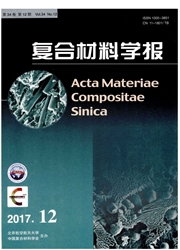

 中文摘要:
中文摘要:
树脂基磁致伸缩复合材料的固化温度及测试与使用温度存在差异,磁致伸缩粒子与基体的热膨胀系数也不同。这将在粒子周围产生热残余应力,并影响复合材料的磁致伸缩性能。理论分析了热残余应力的大小及其影响因素,发现其值随温差增大或粒子体积分数减小而增大。继而,以在不同温度下固化的Terfenol—D颗粒体积分数为20%和50%的环氧基复合材料为研究对象,对理论分析进行了试验验证。试验结果表明:随固化温度升高,由于热压应力的增大,复合材料的动静态磁致伸缩性能均得到提高;粒子体积分数的增加在降低其所受的热压应力的同时,也提高了功能体的含量,材料磁致伸缩系数的升降取决于这两个作用的耦合。
 英文摘要:
英文摘要:
For polymer-bonded Terfenol-D composites, the difference between cure temperature and application temperature and the difference in thermal expansion coefficient between the magnetostrictive particle and polymer matrix result in thermal stress in particles, which will influence the magnetostrictive properties of the smart compos- ites. In this paper, the value of the thermal stress and the factors which influence it are analyzed theoretically, which indicates that the thermal stress increases with the increase of the temperature difference and the decrease of the particle volume fraction. Then at various cure temperatures and a constant orientation field, 20% and 50% volume fraction epoxy-bonded Terfenol-D composites were fabricated and tested at room temperature. The experimental results indicate that both the dynamic and static magnetostrictive properties of the composites increase with the increasing cure temperature because of the increase of the thermal stress. But they do not decrease with the increase of the particle volume fraction although the thermal stress decreases, because the positive effect of the increase of the function phase offsets or even exceeds the negative effect.
 同期刊论文项目
同期刊论文项目
 同项目期刊论文
同项目期刊论文
 期刊信息
期刊信息
